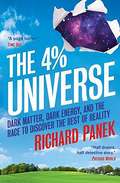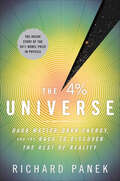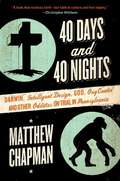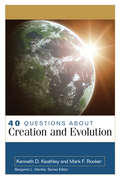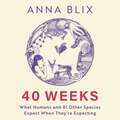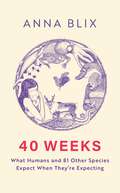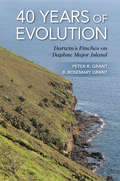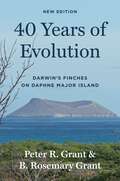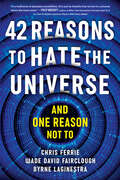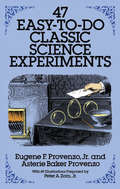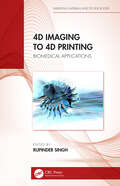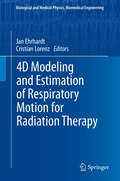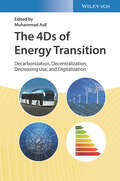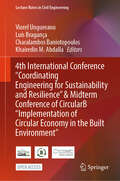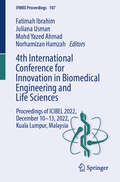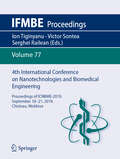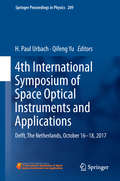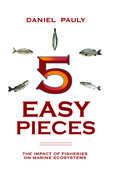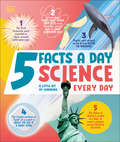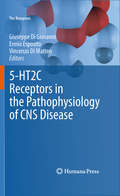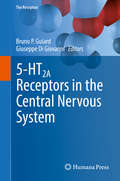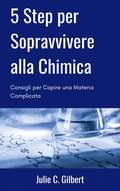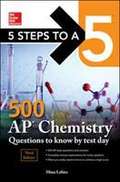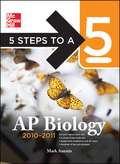- Table View
- List View
The 4-Percent Universe: Dark Matter, Dark Energy, and the Race to Discover the Rest of Reality
by Richard PanekIt is one of the most disturbing aspects of our universe: only four per cent of it consists of the matter that makes up every star, planet, and every book. The rest is completely unknown. Acclaimed science writer Richard Panek tells the story of the handful of scientists who have spent the past few decades on a quest to unlock the secrets of "dark matter" and the even stranger substance called "dark energy". These are perhaps the greatest mysteries in science,and solving them will reshape our understanding of the universe and our place in it. The stakes could not be higher. Panek's fast-paced narrative, filled with original, in-depth reporting and intimate, behind-the-scenes details, brings this epic story to life for the very first time.
The 4% Universe: Dark Matter, Dark Energy, and the Race to Discover the Rest of Reality
by Richard PanekThe epic, behind-the-scenes story of an astounding gap in our scientific knowledge of the cosmos.In the past few years, a handful of scientists have been in a race to explain a disturbing aspect of our universe: only 4 percent of it consists of the matter that makes up you, me, our books, and every planet, star, and galaxy. The rest—96 percent of the universe—is completely unknown. Richard Panek tells the dramatic story of how scientists reached this conclusion, and what they’re doing to find this "dark" matter and an even more bizarre substance called dark energy. Based on in-depth, on-site reporting and hundreds of interviews—with everyone from Berkeley’s feisty Saul Perlmutter and Johns Hopkins’s meticulous Adam Riess to the quietly revolutionary Vera Rubin—the book offers an intimate portrait of the bitter rivalries and fruitful collaborations, the eureka moments and blind alleys, that have fueled their search, redefined science, and reinvented the universe.
40 Days and 40 Nights: Darwin, Intelligent Design, God, Oxycontin®, and Other Oddities on Trial in Pennsylvania
by Matthew ChapmanIn this fascinating story of evolution, religion, politics, and personalities, Matthew Chapman captures the story behind the headlines in the debate over God and science in America.Kitzmiller v. Dover Board of Education, decided in late 2005, pitted the teaching of intelligent design (sometimes known as "creationism in a lab coat") against the teaching of evolution. Matthew Chapman, the great-great-grandson of Charles Darwin, spent several months covering the trial from beginning to end. Through his in-depth encounters with the participants—creationists, preachers, teachers, scientists on both sides of the issue, lawyers, theologians, the judge, and the eleven parents who resisted the fundamentalist proponents of intelligent design—Chapman tells a sometimes terrifying, often hilarious, and above all moving story of ordinary people doing battle in America over the place of religion and science in modern life.
40 Questions About Creation and Evolution (40 Questions & Answers Series)
by Kenneth Keathley Mark F. RookerBiblically and scientifically informed answers to pressing questions about the creation-evolution debateThis accessible volume evenly addresses the issues of modern science and the scriptural texts. The conservative evangelical authors are well-informed on contemporary scientific views of the universe and also carefully exegete the biblical texts that pertain to creation. They irenically consider the various angles of the debate and make constructive suggestions to reconcile science and the Bible.Those who are curious about the origins of life and the universe will want to read this book. Seminary students and serious college students will find this information critical, as an understanding of creation is vital to an effective apologetic in sharing the faith.
40 Weeks: What Humans and 81 Other Species Expect When They're Expecting
by Anna BlixMatrescene meets the Golden Mole - discover what the animal kingdom expects when it's expectingIt takes 40 weeks to grow a human baby. And the relationship between a foetus and a pregnant woman is a little like that of a parasite and its host. One takes and takes, while the other continues to give, risking their health in the process.Is there a better way?The Komodo dragon can reproduce via pathogenesis - fertilising its own eggs, so no male is needed.The Surinam toad harbours live babies in craters under its skin - until they're ready to burst out into the world. And the hyena . . . Well, best not mention the hyena . . .Anna Blix takes the reader on a fascinating journey through her own pregnancy, introducing us in each of the 40 weeks to other creatures who have just delivered their next generation into the world. This fun, informative and personable book provides evolutionary comfort throughout the long haul of pregnancy, and an explanation as to how we ended up here: as the smartest species with a tiresome, but perhaps not so bad way to reproduce. It could always be worse. Just ask the hyena.Translated from the Norwegian by Nicola Smalley
40 Weeks: What Humans and 81 Other Species Expect When They're Expecting
by Anna BlixMatrescene meets the Golden Mole - discover what the animal kingdom expects when it's expectingIt takes 40 weeks to grow a human baby. And the relationship between a foetus and a pregnant woman is a little like that of a parasite and its host. One takes and takes, while the other continues to give, risking their health in the process.Is there a better way?The Komodo dragon can reproduce via pathogenesis - fertilising its own eggs, so no male is needed.The Surinam toad harbours live babies in craters under its skin - until they're ready to burst out into the world.And the hyena . . . Well, best not mention the hyena . . .Anna Blix takes the reader on a fascinating journey through her own pregnancy, introducing us in each of the 40 weeks to other creatures who have just delivered their next generation into the world. This fun, informative and personable book provides evolutionary comfort throughout the long haul of pregnancy, and an explanation as to how we ended up here: as the smartest species with a tiresome, but perhaps not so bad way to reproduce. It could always be worse. Just ask the hyena.Translated from the Norwegian by Nicola Smalley
40 Years of Evolution: Darwin's Finches on Daphne Major Island
by Peter R. Grant B. Rosemary GrantAn important look at a groundbreaking forty-year study of Darwin's finchesRenowned evolutionary biologists Peter and Rosemary Grant have produced landmark studies of the Galápagos finches first made famous by Charles Darwin. In How and Why Species Multiply, they offered a complete evolutionary history of Darwin's finches since their origin almost three million years ago. Now, in their richly illustrated new book, 40 Years of Evolution, the authors turn their attention to events taking place on a contemporary scale. By continuously tracking finch populations over a period of four decades, they uncover the causes and consequences of significant events leading to evolutionary changes in species.The authors used a vast and unparalleled range of ecological, behavioral, and genetic data—including song recordings, DNA analyses, and feeding and breeding behavior—to measure changes in finch populations on the small island of Daphne Major in the Galápagos archipelago. They find that natural selection happens repeatedly, that finches hybridize and exchange genes rarely, and that they compete for scarce food in times of drought, with the remarkable result that the finch populations today differ significantly in average beak size and shape from those of forty years ago. The authors' most spectacular discovery is the initiation and establishment of a new lineage that now behaves as a new species, differing from others in size, song, and other characteristics. The authors emphasize the immeasurable value of continuous long-term studies of natural populations and of critical opportunities for detecting and understanding rare but significant events.By following the fates of finches for several generations, 40 Years of Evolution offers unparalleled insights into ecological and evolutionary changes in natural environments.
40 Years of Evolution: Darwin's Finches on Daphne Major Island, New Edition
by Peter R. Grant B. Rosemary GrantA new edition of Peter and Rosemary Grant&’s classic account of their groundbreaking forty-year study of Darwin&’s finches40 Years of Evolution is a landmark study of the finches first made famous by Charles Darwin, one that documents as never before the evolution of species through natural selection. In this now-legendary study, renowned evolutionary biologists Peter and Rosemary Grant draw on a vast and unparalleled range of ecological, behavioral, and genetic data to continuously measure changes in finch populations over a period of four decades on the small island of Daphne Major in the Galápagos archipelago. In the years since the book&’s publication, the field of genomics has developed greatly. In this newly revised edition of 40 Years of Evolution, the Grants combine the results of their historic field study with genomic analyses of their primary findings, resolve unanswered questions from the field, and provide invaluable insights into the genetic basis of beak and body size variation and the history of this iconic adaptive radiation.
42 Reasons to Hate the Universe: (And One Reason Not To)
by Chris Ferrie Wade David Fairclough Byrne LaGinestraIf you've always suspected the universe was out to get you… you were right!Yes, the universe we live in is cosmically beautiful and mysterious and all that crap. But it's also a bit of an asshole. After all, remember that you are just a group of atoms structured in a specific way for barely long enough to try to understand this thing we call existence. Those atoms could just have easily been used to make the dog shit you're cleaning off your shoe or the mold that grows on your bread! The fact is, when you zoom out to look at the universe and how it functions, you'll see that it's usually not in our favor, and many of the laws of physics are actively working against our survival. In this book, you'll discover why:You're an aging mutantInvisible rays are melting our genetic codeThe Earth is covered in explosive pimplesLiterally everything is poisonousAnd more true and terrifying scientific facts!But don't worry! While it's true that there are (at least) forty-two grudges to hold against the universe, the good news is that there is also one very good reason to forgive them all and embrace the wild, improbable fact that we are alive (for now) and we should take advantage of it while we can. 42 Reasons to Hate the Universe (And One Reason Not To) is a hilarious, no-holds-barred exploration of all the reasons we shouldn't exist—but somehow do anyway. Rooted in scientific research but written simply so that evolved apes such as ourselves can understand where the heck we came from and where we're likely going, this book is for all the nerds and nihilists who know they're going down in the end but want to enjoy the rollercoaster ride of existence on the way.
47 Easy-to-Do Classic Science Experiments (Dover Children's Science Books)
by Eugene F. Provenzo Jr. Asterie Baker ProvenzoHere is a highly motivating book for grade-school students that will introduce them to many of the world's most popular (and historically significant) scientific experiments. They'll learn about gravity simply by following the acrobatic antics of an ordinary coin. By trying to blow an egg out of a cup, they'll discover the principles of air pressure. Dancing soap bubbles will help them understand the effects of static electricity, and by dropping quarters into a full glass of water without causing it to overflow, they'll study the effects of surface tension.These and over 40 other experiments have been carefully selected by noted educators Eugene and Asterie Baker Provenzo to familiarize children with classic science experiments involving optics, inertia, air pressure, magnetism, sound, topology, light, density, vibration, prisms, elasticity, gases, vacuum, perspective, geometry, centrifugal force, buoyancy, color, and much more. Some experiments, such as the optical "Newton's Rings" are hundreds of years old. Still others, like the straw lever test, are based on Greek experiments with leverage and the center of gravity -- first carried out thousands of years ago.Easy-to-follow instructions and illustrations show youngsters how to perform each experiment, most of which are prefaced with historical background, a list of necessary materials and an explanation of key terms. Almost all experiments can be carried out with common household items (tissue paper, scissors, tapes, rubber balloons, pens, pencils, etc.) and can be worked at home or in the classroom to demonstrate specific scientific principles or to supplement a science-curriculum unit. Sources for all historical illustrations given in the text are listed at the end of the book.
4D Imaging to 4D Printing: Biomedical Applications (Emerging Materials and Technologies)
by Rupinder SinghThis book focuses on applications of 4D imaging and 4D printing for development of low-cost, indigenous lab-scale solutions for various biomedical applications. It is based on a selection of benchmark open-source 4D imaging solutions including the effect of different stimulus (such as light, electric field, magnetic field, mechanical load, thermal, hydro, and so forth) to better understand 4D capabilities of printed components. The material is covered across nine chapters dedicated to 4D imaging, 4D printing, and their specific biomedical applications illustrated via case studies related to orthopaedic and dental requirements of veterinary patients. The book: •Presents exclusive material on the integration of 4D imaging and 4D printing•Demonstrates the industrial applications of 4D imaging in 4D printing using multiple case studies•Discusses use of open-source 4D imaging tools for biomedical applications•Includes in-house development of smart materials for 4D printing•Reviews low-cost, indigenous lab-scale solutions for various veterinary applications. This book is aimed at graduate students and researchers in Additive Manufacturing, Manufacturing Engineering, Production Engineering, Mechanical Engineering, and Materials Engineering.
4D Modeling and Estimation of Respiratory Motion for Radiation Therapy (Biological and Medical Physics, Biomedical Engineering)
by Cristian Lorenz Jan EhrhardtRespiratory motion causes an important uncertainty in radiotherapy planning of the thorax and upper abdomen. The main objective of radiation therapy is to eradicate or shrink tumor cells without damaging the surrounding tissue by delivering a high radiation dose to the tumor region and a dose as low as possible to healthy organ tissues. Meeting this demand remains a challenge especially in case of lung tumors due to breathing-induced tumor and organ motion where motion amplitudes can measure up to several centimeters. Therefore, modeling of respiratory motion has become increasingly important in radiation therapy. With 4D imaging techniques spatiotemporal image sequences can be acquired to investigate dynamic processes in the patient's body. Furthermore, image registration enables the estimation of the breathing-induced motion and the description of the temporal change in position and shape of the structures of interest by establishing the correspondence between images acquired at different phases of the breathing cycle. In radiation therapy these motion estimations are used to define accurate treatment margins, e.g. to calculate dose distributions and to develop prediction models for gated or robotic radiotherapy. In this book, the increasing role of image registration and motion estimation algorithms for the interpretation of complex 4D medical image sequences is illustrated. Different 4D CT image acquisition techniques and conceptually different motion estimation algorithms are presented. The clinical relevance is demonstrated by means of example applications which are related to the radiation therapy of thoracic and abdominal tumors. The state of the art and perspectives are shown by an insight into the current field of research. The book is addressed to biomedical engineers, medical physicists, researchers and physicians working in the fields of medical image analysis, radiology and radiation therapy.
The 4Ds of Energy Transition: Decarbonization, Decentralization, Decreasing Use, and Digitalization
by Muhammad AsifThe 4Ds of Energy Transition Enables readers to understand technology-driven approaches that address the challenges of today’s energy scenario and the shift towards sustainable energy transition This book provides a comprehensive account of the characteristics of energy transition, covering the latest advancements, trends, and practices around the topic. It charts the path to global energy sustainability based on existing technology by focusing on the four dynamic approaches of decarbonization, decreasing use, decentralization, and digitalization, plus the important technical, economic, social and policy perspectives surrounding those approaches. Each technology is demonstrated with an introduction and a set of specific chapters. The work appropriately incorporates up-to-date data, case studies, and comparative assessments to further aid in reader comprehension. Sample topics discussed within the work by key thinkers and researchers in the broader fields of energy include: Renewable energy and sustainable energy future Decarbonization in energy sector Hydrogen and fuel cells Electric mobility and sustainable transportation Energy conservation and management Distributed and off-grid generation, energy storage, and batteries Digitalization in energy sector; smart meters, smart grids, blockchain This book is an ideal professional resource for engineers, academics, and policy makers working in areas related to the development of energy solutions.
4th International Conference "Coordinating Engineering for Sustainability and Resilience" & Midterm Conference of CircularB “Implementation of Circular Economy in the Built Environment” (Lecture Notes in Civil Engineering #489)
by Viorel Ungureanu Luís Bragança Charalambos Baniotopoulos Khairedin M. AbdallaThis open access book gathers the proceedings of the 4th International Conference “Coordinating Engineering for Sustainability and Resilience” (CESARE) & Midterm Conference of CircularB “Implementation of Circular Economy in the Built Environment”, held in Timișoara, Romania, on May 29-31, 2024, as part of the COST Action CA21103. The volume represents the state of the art of sustainability and resilience in modern and future built environment, constructions, and infrastructure, and includes topics such as structural materials and robustness, fire engineering, risk assessment, impact of climate change on the built environment, sustainable resilience of systems in the built environment, smart cities, circular economy, design strategies for product design, integration of renewable energy at building and small urban area scales, restoration & rehabilitation of historical buildings, sustainable infrastructures, wind energy structures, façade engineering, green buildings, and waste management.
4th International Conference for Innovation in Biomedical Engineering and Life Sciences: Proceedings of ICIBEL 2022, December 10–13, 2022, Kuala Lumpur, Malaysia (IFMBE Proceedings #107)
by Fatimah Ibrahim Juliana Usman Mohd Yazed Ahmad Norhamizan HamzahThis book reports on engineering methods and technologies for biomedical applications. It covers sensors and devices for biological and medical purposes, along with their fabrication and testing, and advances in engineering technologies, such as autonomous systems, which can support life science and healthcare in the era of industry 4.0. Based on the proceedings of the 4th International Conference for Innovation in Biomedical Engineering and Life Sciences, ICIBEL 2022, held on December 10–13, 2022, in Kuala Lumpur, Malaysia, this book provides researchers and professionals with a timely snapshot of current issues and challenges in the broad field of biomedical engineering. It is aimed at inspiring future research and fostering interdisciplinary and international collaborations in this field and relating ones.
4th International Conference on Nanotechnologies and Biomedical Engineering: Proceedings of ICNBME-2019, September 18-21, 2019, Chisinau, Moldova (IFMBE Proceedings #77)
by Ion Tiginyanu Victor Sontea Serghei RaileanThis book gathers the proceedings of the 4th International Conference on Nanotechnologies and Biomedical Engineering, held on September 18-21, 2019, in Chisinau, Republic of Moldova. It continues the tradition of the previous conference proceedings, thus reporting on both fundamental and applied research at the interface between nanotechnologies and biomedical engineering. Topics include: developments in bio-micro/nanotechnologies and devices; biomedical signal processing; biomedical imaging; biomaterials for biomedical applications; biomimetics; bioinformatics and e-health, and advances in a number of related areas. The book offers a timely snapshot of cutting-edge, multidisciplinary research and developments in the field of biomedical and nano-engineering.
4th International Symposium of Space Optical Instruments and Applications: Delft, The Netherlands, October 16 -18, 2017 (Springer Proceedings in Physics #209)
by H. Paul Urbach Qifeng YuThis book gathers selected and expanded contributions presented at the 4th Symposium on Space Optical Instruments and Applications, which was held in Delft, the Netherlands, on October 16–18, 2017. This conference series is organized by the Sino-Holland Space Optical Instruments Laboratory, a cooperative platform between China and the Netherlands. The symposium focused on key technological problems regarding optical instruments and their applications in a space context. It covered the latest developments, experiments and results on the theory, instrumentation and applications of space optics. The book is split into five main sections: The first covers optical remote sensing system design, the second focuses on advanced optical system design, and the third addresses remote sensor calibration and measurement. Remote sensing data processing and information extraction are then presented, followed by a final section on remote sensing data applications.
5 Easy Pieces: The Impact of Fisheries on Marine Ecosystems
by Daniel Pauly5Easy Pieces features five contributions, originally published in Nature and Science, demonstrating the massive impacts of modern industrial fisheries on marine ecosystems. Initially published over an eight-year period, from 1995 to 2003, these articles illustrate a transition in scientific thought--from the initially-contested realization that the crisis of fisheries and their underlying ocean ecosystems was, in fact, global to its broad acceptance by mainstream scientific and public opinion. Daniel Pauly, a well-known fisheries expert who was a co-author of all five articles, presents each original article here and surrounds it with a rich array of contemporary comments, many of which led Pauly and his colleagues to further study. In addition, Pauly documents how popular media reported on the articles and their findings. By doing so, he demonstrates how science evolves. In one chapter, for example, the popular media pick up a contribution and use Pauly's conclusions to contextualize current political disputes; in another, what might be seen as nitpicking by fellow scientists leads Pauly and his colleagues to strengthen their case that commercial fishing is endangering the global marine ecosystem. This structure also allows readers to see how scientists' interactions with the popular media can shape the reception of their own, sometimes controversial, scientific studies. In an epilog, Pauly reflects on the ways that scientific consensus emerges from discussions both within and outside the scientific community.
5 Facts a Day Science: A Little Bit of Learning Every Day
by DKAre you ready to have your mind blown? Wow all your friends and family with 5 jaw-dropping facts about science each day.Discover 5 facts a day, 5 days a week with this exciting science book for children aged 8-12. With five facts a day, every day of the year, that’s more than 1,825 nuggets of knowledge!From rocks to robots, and cells to solar systems, this eye-opening book covers more than 250 different science topics in an easy-to-read, entertaining, and bite-sized way to build on your knowledge as you go. Enjoy learning something new every day or just dip in and out for fun.This science book for children offers: An engaging layout, with different subjects and facts to explore every day.More than 250 different science topics, from electromagnetism to evolution.Fun, educational content for children to have fun whilst learning about science.Did you know that you can't burp in space? Or that bananas are slightly radioactive? Or that there are more trees on Earth than there are stars in our solar system? Discover the science behind all these facts and much more with 5 Facts a Day: Science.
5-HT2C Receptors in the Pathophysiology of CNS Disease: 5-ht2c Receptors In The Pathophysiology Of Cns Disease (The Receptors #22)
by Vincenzo Di Matteo Giuseppe Di Giovanni Ennio EspositoPart of Springer's "The Receptors," series, this text is the first ever overview on the research of 5-HT2c receptors. 5-HT2c receptor research has been productive for twenty-five years, but recent years have seen an extraordinary increase in both amount produced and insight gained. 5-HT2c is a prominent central serotonin receptor subtype widely expressed within the central and the peripheral nervous system and is thought to play a key role in the regulation of numerous behaviors. This text covers the molecular, cellular, anatomical, biochemical and behavioral aspects of this receptor, highlighting its distinctive regulatory properties and the emerging functional significance of constitutive activity and RNA-editing in vivo. It also investigates the receptors' therapeutic potential in many diseases, treated individually in separate chapters, including depression, drug abuse, schizophrenia, eating disorders, Parkinson's disease, Prader-Willi Syndrome, Alzheimer's disease and epilepsy.
5-HT2A Receptors in the Central Nervous System (The Receptors #32)
by Giuseppe Di Giovanni Bruno P. Guiard5-HT2A receptors are G-protein coupled receptors that are widely distributed throughout the brain, most notably on neuronal and glial cells. 5-HT2A receptors have been implicated in various central physiological functions including mood regulation, memory, sleep, nociception, eating, and reward behaviors, and they are also believed to control the cardiovascular system. This book provides a comprehensive overview of these receptors including sections on their properties and distribution, approaches for their study, their role in a number of brain functions and diseases, and their role as therapeutic targets.
5 Step per Sopravvivere alla Chimica: Consigli per Capire una Materia Complicata
by Julie C. GilbertHai difficoltà con la chimica? Non sei solo. È facile perdersi nel linguaggio tecnico. Aiuta qualsiasi libro di testo con queste istruzioni per completare i tuoi compiti ed esercizi. Impara tutto quelo che c'è da imparare e magari divertiti anche nel frattempo. Dentro, troverai … • 13 capitoli semplici da leggere divisi per argomento • Istruzioni dettagliate per avere a che fare con la matematica • Trucchi e consigli per capire meglio • Errori comuni da evitare Bonus: Consigli per comunicare in maniera più efficace con il tuo insegnanre “Eccellente esposizione degli argomenti chiave per gli studenti di chimica di tutti i livelli (scuole superiori e università)” ~ David A. Hunt, Ph.D., The College of New Jersey, Professor of Chemistry
5 Steps To A 5: 500 AP Chemistry Questions To Know by Test Day
by Mina LebitzThis book gives 500 practice questions that cover the most essential course material and help you work toward a 5 on the test. The questions parallel the format and degree of difficulty that you’ll find on the actual AP exams and are accompanied by answers with comprehensive explanations.
5 Steps to a 5 AP Biology, 2010-2011 Edition
by Mark AnestisThe effective, five-step plan to help you succeed on the AP Biology exam. Biology is one of the more popular AP tests; it is also one of the most demanding. This popular guide provides all the latest information on the course and on the test itself.
5 Steps to a 5 AP Chemistry, 2012-2013
by Richard H. Langley John MooreA Perfect Plan for the Perfect Score. We want you to succeed on your AP* exam. That's why we've created this 5-step plan to help you study more effectively, use your preparation time wisely, and get your best score. This easy-to-follow guide offers you a complete review of your AP course, strategies to give you the edge on test day, and plenty of practice with AP-style test questions. You'll sharpen your subject knowledge, strengthen your thinking skills, and build your test-taking confidence with Full-length practice exams modeled on the real test All the terms and concepts you need to know to get your best score Your choice of three customized study schedules--so you can pick the one that meets your needs The 5-Step Plan helps you get the most out of your study time: Step 1: Set Up Your Study Program Step 2: Determine Your Readiness Step 3: Develop the Strategies Step 4: Review the Knowledge Step 5: Build Your Confidence Topics include:Listening Comprehension; Reading Comprehension: Longer Passages; Paragraph Completion with Root Words; Paragraph Completion without Root Words; Informal Writing (Interpersonal); Formal Writing / Integrated Skills (Presentational); Informal Speaking--Simulated Conversation (Interpersonal); and Formal Oral Presentation / Integrated Skills (Presentational) Also includes: An MP3 disk and practice exams *AP, Advanced Placement Program, and College Board are registered trademarks of the College Entrance Examination Board, which was not involved in the production of, and does not endorse, this product.
